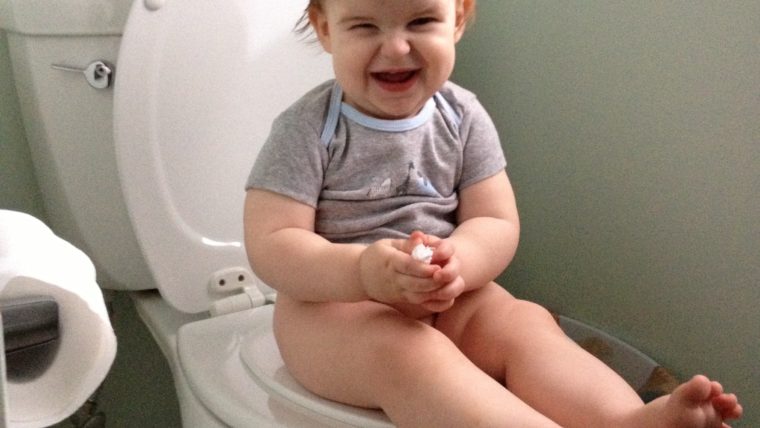
 Elimination Communication (EC) refers to the practice of tuning in to your child’s communications about their elimination needs. It is based on the premise (surprising, in our culture) that even newborn babies have a natural desire for cleanliness and an inborn ability to recognize their own need to eliminate. We used occasional EC with our son almost from birth and have always done it respectfully.
Elimination Communication (EC) refers to the practice of tuning in to your child’s communications about their elimination needs. It is based on the premise (surprising, in our culture) that even newborn babies have a natural desire for cleanliness and an inborn ability to recognize their own need to eliminate. We used occasional EC with our son almost from birth and have always done it respectfully.
Resources for using EC respectfully are limited, and I don’t often see productive discussions about how respectful parenting and EC can fit together or how EC can be done with the utmost respect for the child. My story is a perfect example of how it worked in my family and with my child. It won’t work for everyone and it will look different for some. The most important thing is to keep listening to your child, to set your agenda aside, and to parent with respect.
I was skeptical at first, but when I tried it with my two-week-old baby, I was amazed! I had no idea that I would be able to tune in to him with such awareness and to mindfully recognize his unique way of communicating his needs to me. I began to realize that he would usually need to eliminate about 20-30 minutes after nursing and would not go in his sleep. He also had a particular wiggle he would do, or would make a specific face when he needed to go. I was often able to say to him, “It looks like you need to pee/poop. I will take you to the sink.” I would carry him back, take off his diaper, and hold him over the sink in my arms and he would eliminate! I also learned to slow down and wait for his responses when I let him know I would take him to the bathroom. Occasionally, he made it clear, by stiffening his body and looking away, that he did not want to go, but more often, he would lift his head to be picked up. It was incredible! I have never felt so in tune with someone in my life!
As he got older and became more active, there would be times when he would not want me to take him, or when he did not communicate a need, and I always listened. We always offered the potty at diaper changes, but never forced the issue. I did not interrupt his play with the goal of keeping him dry, and we avoided diaper-free time because we felt it would add too much pressure to be dry. We did not try to “catch” every pee or poop, but taking him to the sink/potty several times a day over the first 12-18 months of his life helped him to maintain an awareness of his natural elimination functions, rather than “diaper-training” him from birth, and held open this line of communication that many people miss. The vast majority of parents never get the opportunity to give this gift to their child of listening and assisting the child in meeting their most basic of needs in such a tuned-in way. I feel so lucky to have been able to share this communication opportunity with my child from early on and was often moved by the fact that I was able to understand the communication of my newborn child in this way then, and as he grew.
Now he is two and a half years old and he has been independently letting me know when he has to poop for at least six months and every poop for that period of time has been in the potty. He has just recently started to tell me sometimes before he has to pee. He is so thrilled and proud when he pees and poops in the potty, and it has always been self-motivated and never pressured. I think many parents are in a hurry to potty train for a variety of reasons, at least one of which I am sure is because they simply hate changing diapers! I haven’t had to change a poopy diaper in six months, but it has been all on his terms.
We are in no hurry to potty train and have not even mentioned underpants to him, because he sees that we do not wear diapers and we are confident that he will let us know when he is ready. We are aware that daytime dryness (at least in this culture) is a developmental milestone most children reach between age three and four and we know he will do it when he is ready. He is already well on his way and he has done it all himself.
UPDATE: I’ve been having a conversation with some other respectful parenting folks about EC and want to clarify a few misunderstandings. EC is a bit like sleep learning. Elimination and sleep are two things you can never make a child do. You can only help them to be comfortable with the circumstances and the process, but the rest is up to them. The key to EC, like sleep learning, is timing. After the child is about six months old, they will have become diaper-trained. Any attempts at EC after that point should be considered early potty learning and would not be child-led. Therefore, my stance is that attempting EC with any child over six months would not be respectful of the child. You would not tell the parent of a child who has been nursed to sleep for six months to a year to “just put the baby down drowsy.” It wouldn’t work well and wouldn’t be respectful. The same can be said for EC.
It is up to you to ensure that your practice is respectful, because you may find that some of the recommendations on EC sites are not entirely so. Respectful EC is not about early potty training, or “getting ahead.” It is about communicating with your child more deeply and mindfully and with greater awareness. You can learn more about EC from these sites:
http://www.diaperfreebaby.org
http://ecsimplified.com/elimination-communication-101
http://vibrantwanderings.com/2011/09/respectful-approaches-to-potty-learning.html
http://www.treehugger.com/culture/part-time-diaper-free-elimination-communication-for-the-rest-of-us.html
You can learn more about respectful potty learning here:
http://www.janetlansbury.com/2010/03/in-the-toilet/
http://www.janetlansbury.com/2012/07/toilet-troubles/
http://www.regardingbaby.org/2011/11/28/toilet-learning-made-easy/
http://www.aneverydaystory.com/2013/03/20/toilet-learning/
Here is a discussion about how RIE and EC can work well together:
http://www.janetlansbury.com/community/topic/elimination-communication-and-rie/

I am following whatever debate will be held here.
I’m not sure I agree on that last bit. We started when O was 9m and followed his lead. We didn’t make him stop playing, and he would go up to a full day without a wet diaper. He also showed signs of holding it until he could go on the potty. Now, once he was mobile he did lose interest, and we had setbacks with our move, but I would not agree with a blanket statement that starting after 6m is not respectful.
Thank you for sharing, Lauren. Maybe you’re right, because I was responding, with this whole article, to blanket statements that offended me and blanket statements are almost guaranteed to offend someone. Perhaps I should have worded it differently. That statement was based on the stance that potty learning is a developmental milestone and potty training is generally not child-led, so is perhaps not the most respectful of the child’s natural development.
I have read in multiple places in EC literature that babies are basically diaper trained by six months, so it stands to reason that any attempts at EC after that time would be a form of early potty training. Of course, it depends on the goal. If the goal is complete dryness, it’s hard to imagine how that could be achieved without interrupting play, or how a child would know to signal if their signals had not been met with action for the past six plus months.
If the first period of the baby’s life had been spent observing and identifying elimination times like, “I see you are pooping right now. When you are finished, I will change you,” and then changes to, “I see you are about to poop now. Would you like me to take you to the potty?”, I could see how that could still be a communication and not necessarily potty training. I think it is highly dependent on the goals and the process at any stage.
Any chance someone has a copy of the EC and RIE article? It has been taken down from the website, and I guess the “official” RIE stance is that it is not compatible with RIE (they are eager to kick you out of the RIE fb group if you suggest otherwise). I am just very curious what Janet’s original take was. Thanks!!
Taken down from what website, I’m not sure what you mean? I personally have seen one too many children develop encopresis after doing EC to feel good supporting it completely. Because when a child gets used to certain conditions to use the bathroom if another parent or caregiver misses cues, the child learns to hold until the conditions are right. RIE would want the child to be able to void whenever the urge is there. I can’t speak for Janet but this is my view. Thought my view is also – if it works for you then great, do it, but these are my hesitations.
https://www.huffingtonpost.com/steve-hodges-md/potty-training_b_1424826.html
https://www.goodreads.com/author_blog_posts/7909523-elimination-communication-bad-idea
Ah, sorry I should have been more clear. I’ve seen a few sites including this one point to this link: https://www.janetlansbury.com/community/topic/elimination-communication-and-rie/
But it does not seem to be working for me. I was curious about Janet’s (original) view on EC and RIE (which, from what I understand from the places citing the link, it is that they are compatible in some ways).
Thanks for your additional resources! Definitely good to know.